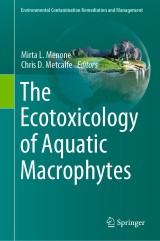Details

The Ecotoxicology of Aquatic Macrophytes
Environmental Contamination Remediation and Management
|
128,39 € |
|
| Verlag: | Springer |
| Format: | |
| Veröffentl.: | 31.05.2023 |
| ISBN/EAN: | 9783031278334 |
| Sprache: | englisch |
Dieses eBook enthält ein Wasserzeichen.
Beschreibungen
<p>This book focuses on the topic of ecotoxicology of aquatic macrophytes and is wide ranging, including the use of macrophytes for remediation of contaminated sites. Many human activities are threats to the equilibrium of natural ecosystems. Pollution from point and non-point sources can be assessed using a variety of techniques, such as biomonitoring, biomarkers and biosensors. In aquatic ecosystems, biomonitoring of pollutants is mostly conducted by analysis of the tissues of invertebrates and fishes, and biomarker studies are also more widely applied to animals rather than in plants. Aquatic macrophytes occupy a key niche in aquatic ecosystems and provide a range of ecosystem services. In addition to their role in primary production, vegetation plays a key role in the cycling and retention of nutrients and generally acts as a sink for pollutants. Therefore, because of their importance to aquatic ecosystems, more attention should be paid to understanding the fate of pollutants and to developing methods to evaluate the health status of macrophytic plants in freshwater, marine and estuarine environments.</p>
1. The Ecotoxicology of Aquatic Macrophytes: An Overview.- 2. Biomarkers in Aquatic Macrophytes: Traditional and Novel Approaches for Monitoring Responses to Exposure to Pollutants.- 3. Metal(loid)s in Macrophytes from the Americas.- 4. Global Perspective for the Use of Aquatic Macrophytes in Regulatory Risk Assessment for Contaminants.- 5. Wild Rice (Zizania spp.) as a Model Macrophyte Toxicity Test Species for Ecotoxicological Risk Assessment.- 6. Recovery of Freshwater Aquatic Macrophytes after Exposure to Herbicides and the Implications for Ecological Risk Assessment.- 7. Vegetated Ditches for Mitigation of Contaminants in Agricultural Runoff.- 8. The “Green Liver” Concept: Green Liver Systems as Low-Impact Systems for Bioremediation Using Aquatic Macrophytes.
This book focuses on the topic of ecotoxicology of aquatic macrophytes and is wide ranging, including the use of macrophytes for remediation of contaminated sites. Many human activities are threats to the equilibrium of natural ecosystems. Pollution from point and non-point sources can be assessed using a variety of techniques, such as biomonitoring, biomarkers and biosensors. In aquatic ecosystems, biomonitoring of pollutants is mostly conducted by analysis of the tissues of invertebrates and fishes, and biomarker studies are also more widely applied to animals rather than in plants. Aquatic macrophytes occupy a key niche in aquatic ecosystems and provide a range of ecosystem services. In addition to their role in primary production, vegetation plays a key role in the cycling and retention of nutrients and generally acts as a sink for pollutants. Therefore, because of their importance to aquatic ecosystems, more attention should be paid to understanding the fate of pollutants and to developing methods to evaluate the health status of macrophytic plants in freshwater, marine and estuarine environments.
Focuses on the topic of ecotoxicology of aquatic macrophytes Includes contributors who are internationally recognized specialists in this field Is wide ranging, including the use of macrophytes for remediation of contaminated sites
Diese Produkte könnten Sie auch interessieren:

Decision Support Systems for Risk-Based Management of Contaminated Sites

von: Antonio Marcomini, Glenn Walter Suter II, Andrea Critto

96,29 €

Dynamics of Mercury Pollution on Regional and Global Scales

von: Nicola Pirrone, Kathryn R. Mahaffey

149,79 €














